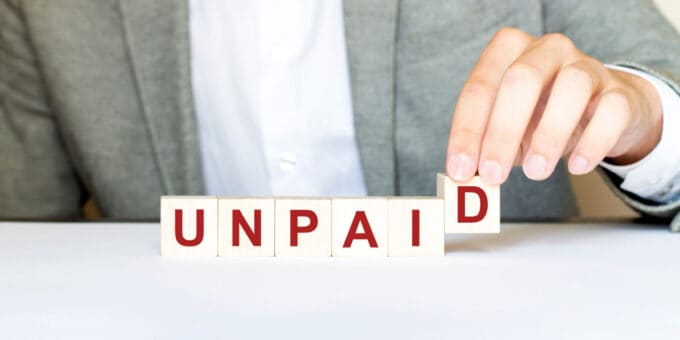Shares normally have to be paid up when a company issues and allots them to someone. Paying up shares means the shareholder paying the company what it owes for the shares.
However, companies may also sometimes issue unpaid or partly paid shares. This means that the shareholder doesn’t pay for the shares when they are issued to them, but may instead pay at a later point.
In this article, we’ll explain what unpaid and partly paid shares are and why companies might issue them. We’ll also clarify when and how unpaid shares in a limited company are paid up.
Key takeaways
- Companies can issue unpaid shares to accommodate shareholders lacking immediate funds, enhancing flexibility in ownership structure.
- Shareholders retain rights associated with unpaid shares unless specific provisions in the articles of association restrict them.
- Proper documentation and processes are essential for issuing unpaid shares, including compliance with the Companies Act 2006.
What are unpaid shares?
Also known as nil-paid shares, unpaid shares are when a shareholder (also known as a member) does not pay any portion of the share’s issue price. The issue price is usually the nominal value of the share (which, in most companies, is just £1.00) but can also include any additional amounts required over the nominal value (this additional amount agreed to be paid over the nominal value is called the ‘premium’).
Instead, they are liable to pay at a later point, such as when the company ‘calls on’ the shares (this means requesting payment), or when the company enters liquidation.
Having unpaid shares does not necessarily affect a shareholder’s rights. They can typically continue to benefit from the rights afforded to them by those shares. For example, if the share grants the right to vote to the shareholder, then they will normally still have that right to vote, regardless of the paid-up status of the shares.
However, this may not always be the case. Companies may draft their articles of association to include certain provisions that prevent shareholders from enjoying some or all of their rights, as a result of their shares being unpaid.
How unpaid shares are issued
In general terms, companies are permitted to issue unpaid shares before and after incorporation. This is normally contingent on the proper provisions being made in the company’s articles of association.
These provisions usually deal with, amongst other things, the processes for “calling on” the shares (i.e. requesting payment), as well as the process to forfeit a shareholder’s shares if they fail to pay up when required.
- Company meetings and resolutions explained
- A guide to limited company shares
- How many shares do I need to issue?
If your company’s articles of association do not include these provisions (for example, if your company uses the Model articles), they will usually need to be amended by a special resolution (which requires at least a 75% majority vote in favour to pass) to make such provisions.
Provided the relevant article provisions are in place, it’s possible to issue a mixture of unpaid and fully paid shares, even within the same share class. If you form a company and its subscribers (the initial shareholders) are all allotted fully paid shares, this doesn’t mean that all future shares must also be fully paid when issued.
Partly paid and fully paid shares
As well as unpaid shares, companies can also issue partly and fully paid shares. Partly paid shares are when some of the issue price is paid upfront.
For example, if you purchase 1 share in a company with an issue price of £1 (being the nominal value) and pay 40p upon issuance, that will result in a partly paid share and the remaining liability is 60p.
The requirements to issue partly-paid shares are the same for companies as they are for unpaid shares – that is, the need for the articles of association to make provisions for issuing shares not fully paid up, the processes for “calling on” the remaining amounts of the shares, forfeiture, and more.
However, if you pay £1 for that same share upfront, the remaining liability is nil, and the share is considered fully paid up. There is usually no further liability for the shareholder to pay.
Why do companies issue unpaid shares?
There are many reasons why companies might choose unpaid (or partly-paid) shares. One of those reasons is flexibility.
Let’s say you want to bring a new shareholder on board, who doesn’t necessarily have the funds immediately available, or wishes to pay for their shares after the company reaches a certain milestone. Issuing unpaid shares allows you to negotiate those terms without passing the opportunity of taking on a valuable shareholder.
Another reason is convenience. Early-stage companies without a business bank account, for example, may be unable to receive payments. However, issuing unpaid shares allows them to take on shareholders with the convenience of deferring consideration until a more suitable time.
Finally, this strategy gives companies the option to have unpaid shares forfeited. This means that the shareholder loses their shares and the rights attached to them, if they fail to pay on the pre-agreed terms. However, this is not an automatic process and the company must issue a notice of forfeiture to set this procedure in motion.
Reporting to Companies House
Companies are legally required to report the allotment of shares (paid, partly paid, or unpaid) via form SH01 within 1 month of the allotment taking place. This document asks for some of the following information:
- Company name and registration number
- Allotment dates
- The currency and class of the allotted shares
- The number of shares being allotted, their nominal value, and the amount paid/unpaid
The form also includes a statement of capital, which is an overview of the company’s share capital.
Additionally, companies must confirm the status of their paid-up shares via the annual confirmation statement. This procedure ensures that the information held by Companies House about your company is correct and up to date.
Paying for unpaid shares
Shares are normally paid for in cash, with the payment being made directly to the company. The exact point at which the shares are paid for will differ, but will often take place when:
- They are transferred
- The directors of the company call on the shares
- The company enters liquidation; or,
- At a pre-agreed future date
Under the Companies Act 2006, it is also possible for companies to accept “non-cash consideration” as payment for shares. Non-cash consideration relates to any payment that is not cash, and includes things like goods, services, property, assets (including shares in other companies), knowledge, and the writing off of debt.
- What are the memorandum and articles of association?
- How to set up a limited company with bespoke articles
In theory, if none of the payment terms are met, then unpaid shares may never become paid.
Transferring unpaid shares
It’s possible to transfer unpaid (or partly paid) shares to a new shareholder, provided there are no restrictions within the company’s articles or shareholders’ agreement (if you have one). In doing so, the new shareholder must also agree to accept the remaining liability for the unpaid shares.
To transfer unpaid shares after your company is formed, a J10 Stock Transfer Form will normally be used (as opposed to the J30 Stock Transfer Form, which is used to transfer fully paid shares). The J10 form asks for some of the following details:
- Consideration (the amount, if any, the shares are being sold for)
- The name of the company in which the shares are being transferred
- The name of the class of shares being transferred
- The number of shares being transferred
- Names and addresses of the transferor (seller) and the transferee (buyer)
The main difference between the J10 and the J30 Stock Transfer Forms is that the former needs to be signed by both the seller and the buyer, whilst the latter needs only to be signed by the seller.
It’s important to note that if payment is taken for the transferred shares, it may be subject to Stamp Duty. More information on tax implications can be found on the gov.uk website.
To help with this process, our team at Rapid Formations offer a Transfer of Shares Service for £69.99 +VAT. Provided we receive all the required information, the documentation can be drafted and delivered to you within just 2-3 working days.
Post-transfer requirements
When the transfer is complete, the transferee’s details must be entered into the company’s register of members, to make the transfer legally effective. A share certificate should then be issued to the transferee.
Finally, you’ll need to notify Companies House as to who holds the shares following the transfer via your annual confirmation statement.
Summary
A shareholder has unpaid shares when the unpaid amount has not yet been paid. Issuing unpaid shares to shareholders can be a useful option in several circumstances, such as when a company doesn’t yet have a bank account, or when the shareholder does not have the funds available to pay for the shares immediately.
Shareholders typically pay for unpaid shares when it is called on by the company, or when the company goes into liquidation, but the terms are governed by the company’s articles of association and shareholders’ agreement (if applicable).
We hope you found this article helpful in understanding what unpaid shares are and why they are issued. If you have any questions or comments, please post them below.














Join The Discussion